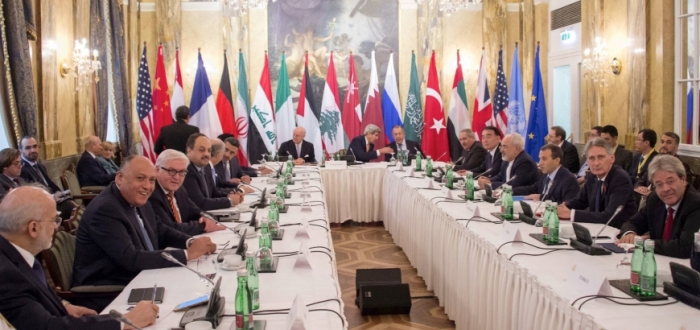The Vienna statement ignores the fundamental basis upon which the political process for a solution in Syria was based; the Geneva I statement, George Sabra, a member of the Syrian National Coalition said.
"Though the name of the Geneva statement was repeated six times in the Vienna statement, it still ignores its basic rules: the formation of a transitional governing body with full executive powers, which means that Assad has no role in the transitional phase, especially since the Geneva I statement was adopted through Security Council resolution No. 2118 and General Assembly resolution No. 266 of 2013", Sabra said.
Responding to questions on whether the Coalition will participate in the forthcoming negotiations, Sabra said: "the Coalition has its own vision of the political solution, we announced it and are committed to it. The basic point in this vision is the commitment to the Geneva I statement. The second point stresses that Assad has no role in the future of Syria. Therefore, it is natural if the Coalition does not accept the Vienna statement."
What is stated in the Vienna statement, Sabra added, does not provide any acceptable political solution, as "the Vienna statement is a reflection of Russian efforts, which began with a military intervention in Syria, killing Syrians for a month and a half."
The international community which met in Vienna linked the launching of the political process and the ceasefire between the Syrian opposition forces and regime forces, but Free Syrian Army Brigadier Ahmed Rahal said the ceasefire in Syria will probably not succeed.
"We must reach a political solution before talking about a ceasefire. Furthermore, the Security Council should find operational tools to prevent any violation of this ceasefire, otherwise it will not succeed."
Rahal pointed to the absence of reasons for optimism towards a ceasefire, questioning what could happen if Lebanon’s Hezbollah or the Nusra Front violated the truce agreement, adding that the ceasefire requires two conditions: the first is reaching a political solution, the second is the deployment of peacekeepers trusted by both sides.
"We cannot accept Russians or Iranians in these peacekeeping forces, and the military operations cannot be terminated that easily. The ceasefire would not be in favor of the opposition forces, as long as it does not come within a road map for a political solution," Rahal explained.
Commenting on the Russian efforts to classify factions of the Syrian opposition as terrorist groups, Rahal said: "This is a new game. Before talking about specifying the terrorist groups among the opposition forces, we must define the terrorists among regime forces and their allies as well. Actually, Assad, Hezbollah and the Shiite Afghani and Iraqi factions should top the list of terrorists."
This article was translated and edited by The Syrian Observer. Responsibility for the information and views set out in this article lies entirely with the author.


